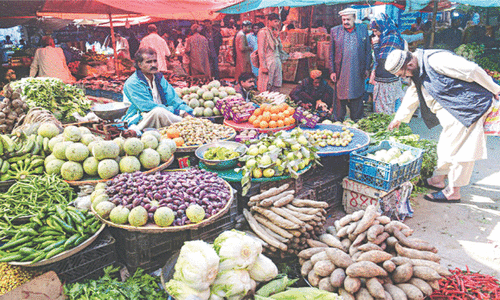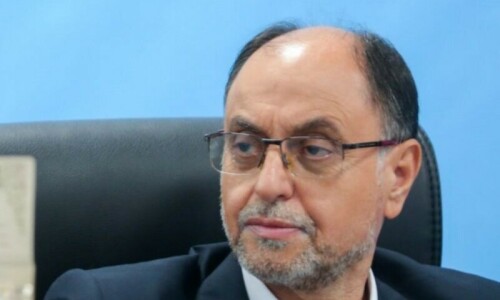KARACHI, July 21: The State Bank says it will continue to fight inflation through further hikes in interest rates in the first half of this fiscal year. The central bank says this in its monetary policy statement as it believes that inflationary expectations may remain high during July-December 2005 despite a depressing impact on it of the interest rates acceleration since April 2005. The factors that may keep the inflationary expectations high include a possible adverse impact on food supplies of the recent floods and heavy rains. Other factors include absence of room for further increase in production capacity of some key industries including fertilizers and steel; outlook of upward pressure on world oil prices; and substantial expansion in consumer loans.
“The balance of risks indicates that domestic prices may continue to remain under pressure (during July-December 2005),” the central bank says in its monetary policy statement issued here on Thursday evening. Earlier in the day, the SBP board of directors approved the policy at its meeting held in Quetta with Governor Dr. Ishrat Husain in the chair.
The statement says the SBP will continue its tight monetary policy to fight inflation “and bring it down to a reasonable level” during July-December this year. The central bank “will also continue to ensure “stability in exchange rates,” it adds.
The statement makes no comment on whether the SBP will follow a gradual and measured tightening of interest rates or go for faster rate hikes to contain inflation. What will determine the extent of changes in interest rates are “the magnitude, direction and speed of inflationary pressures.”
In so saying the central bank has kept open the option of allowing interest rates to rise at times and also stabilize them occasionally i.e. when inflationary pressures subside to the desired levels. This guarded statement by the central bank also allows it some space to make a gradual and measured tightening of interest rates at times and go for occasional aggressive hiking when inflationary pressures become more pronounced.
The central bank says that domestic prices are likely to remain under pressure during July-December 2005 due to high world oil prices; widening trade deficit as well as rising interest rates in the world financial markets. It says that the recent floods and heavy rains may also impact adversely on essential food supplies thereby fuelling inflation.
So, fighting inflation and lowering it to a reasonable level would be the key objective of the monetary policy, says the SBP adding that the central bank “will continue to observe movements of all key variables” and take “timely corrective actions.” This makes it clear that while continuing its fight against inflation the central bank will not lose sight of the fact that its policies should help achieve a high economic growth. The government has set seven per cent growth target for the current fiscal year, down from 8.4 per cent during the last year. The target for inflation has been set at eight per cent, down from about 9.3 per cent last year.
That is why while making a resolve to keep interest rates tight to fight inflation during the first half of this fiscal year; the central bank says that it would also ensure that “the credit expansion is targeted to support SME and agriculture sectors.”
The reason is the two sectors “generate most of the employment in the economy.” The SBP says that it would also ensure expansion in bank credit to the private sector for further capacity expansion of vital industries and BMR initiatives. During the last fiscal year, the private sector is estimated to have received a record high bank credit of around Rs400 billion. (Exact credit offtake was Rs390.3 billion during July 1, 2004 and June 25, 2005).
ECONOMIC OUTLOOK: The SBP says the economy is project ed to perform well during the current fiscal year with economic growth reaching seven per cent tagged with an inflation of eight per cent. It says that manufacturing sector is set to grow by 11 per cent and agriculture by 4.8 per cent. The central bank says that to achieve these targets, it has set a monetary expansion target of 13 per cent envisaging Rs330 billion bank credit for the private sector. It also says that “the acceleration in interest rates since April 2005 is expected to depress inflationary pressures and help achieve the inflation target of eight per cent by the end of the current fiscal year.”
On April 11, the SBP increased its discount rate by one and a half percentage points to 9 per cent and then made some sharp increases in treasury bills rates before allowing them to stabilize in June.
Other factors expected to help contain inflation include:
1. The increased supply of domestically produced goods and services as a result of continued and rapid GDP growth.
2. Capacity expansion and BMR in key industries.
3. Improved food supplies from substantial growth of 17.3 per cent in the production of major crops last year supplemented by duty-free imports of 11 essential food items from neighbouring countries.
4. Further improvement in fiscal discipline through the enactment of Fiscal Responsibility and Debt Limitation Law along with sustained improvement in financial position of public sector enterprises and decline in revenue deficit.
5. Expectation of stable exchange rates on the back of sizable forex reserves and sustained annual inflows of remittances from the overseas Pakistanis plus foreign direct investment.
6. Increased productivity and efficiency of textile industry and ongoing expansion in automobile, electronics and cement industries.
Despite these moderating influences, inflationary expectations are likely to continue for the following reasons: 1. Capacity constraints in key industries like fertilizer, paper and paper board, and steel. 2. Potential adverse impact of recent floods and heavy rains on essential food supplies. 3. Outlook of upward pressure on world oil price. 4. Substantial expansion in consumer loans. Consumer loans rose by 93.1 per cent to Rs80.3 billion in the last fiscal year.














































Dear visitor, the comments section is undergoing an overhaul and will return soon.